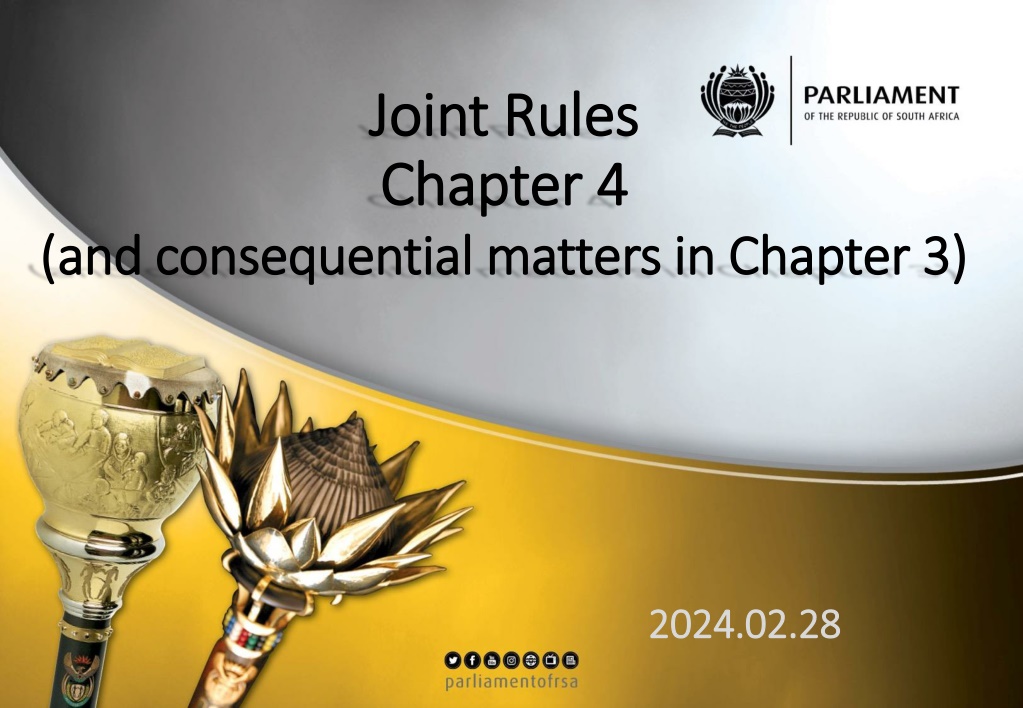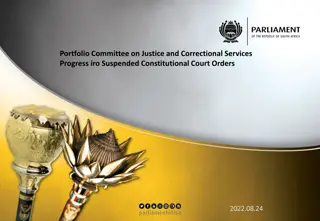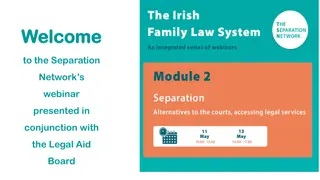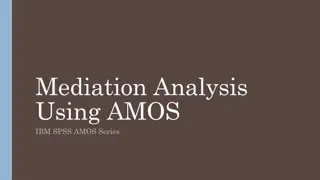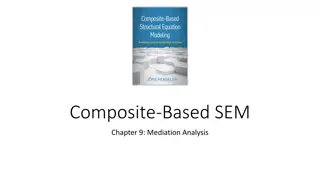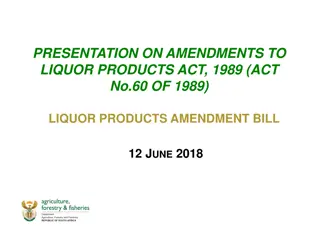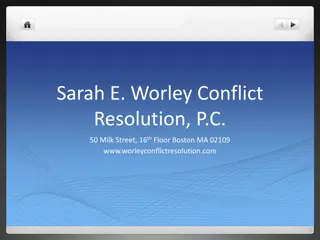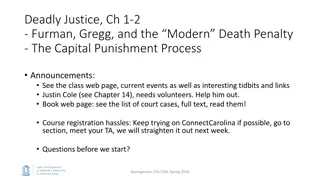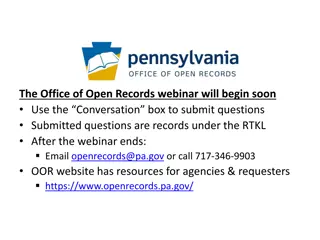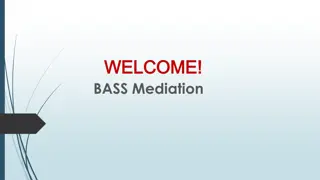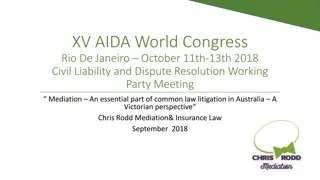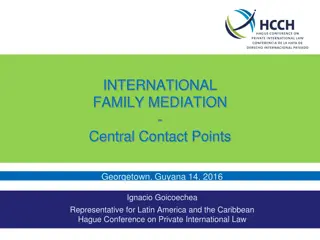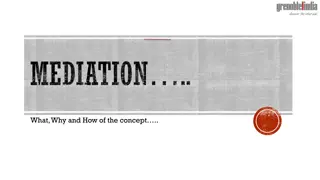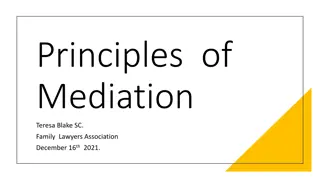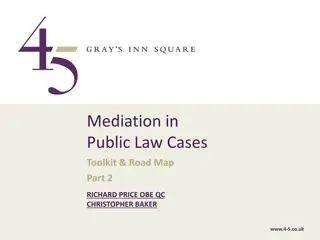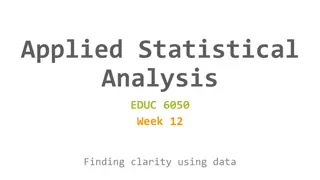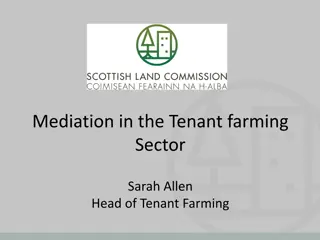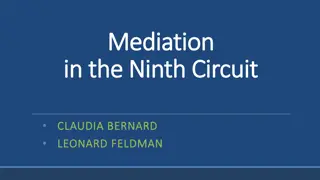Proposed Amendments for Enhanced Mediation Procedures and Constitutional Review
Proposals for improving mediation processes in parliamentary procedures, including the establishment of mediation committees and clarifying timeframes. Additionally, suggestions to enhance the role of the Constitutional Review Committee in scrutinizing Constitution Amendment Bills.
Download Presentation

Please find below an Image/Link to download the presentation.
The content on the website is provided AS IS for your information and personal use only. It may not be sold, licensed, or shared on other websites without obtaining consent from the author. Download presentation by click this link. If you encounter any issues during the download, it is possible that the publisher has removed the file from their server.
E N D
Presentation Transcript
Joint Rules Joint Rules Chapter 4 Chapter 4 (and consequential matters in Chapter 3) (and consequential matters in Chapter 3) 2024.02.28 2024.02.28
Mediation (1) Affects: Chapter 3: JR 15 (list of Joint Committees); JR 104 (Composition of mediation committee); Consequential amendments to JR 105, 107, 109 + proposing a new rule for the establishment of a mediation committee; and Chapter 4: 177 (S74 Bills); 186 (S76 Bills); JR 219 (ATC). Clarifying the process: Section 78 Constitution speaks of the Mediation Committee , but it does not establish one. Proposal: The rules should not state established by section 78 , as this also affects referral of a Bill, which has time implications (JR15). Practice: Members are elected only when the Committee needs to consider a Bill. Challenge: What is step 1 when a Bill must be referred? Who is responsible? It is proposed that the process be set out in more detail in the rules: 1. Announcement in ATC that a Bill must be referred for mediation: JR219; 2. The Houses must as soon as reasonably possible establish a mediation Committee and appoint members New rule; and 3. Once established, the Bill is referred New Rule + JR219 (ATC announcement).2
Mediation (2) - Other proposals on mediation: Clarify when the 30 days period contemplated in section 76 commences: Challenge: ATC currently announces referral of a Bill for mediation before the Committee is even established. Challenge: Speed is envisaged in the Constitution, but the programme of Parliament does not always allow for 30 days to follow immediately from the decision of the one House (e.g. recess). Proposal: The time requirement to establish a Committee is worded as soon as reasonably possible , thus allowing for instances of recess etc. New rule, JR 177; and Proposal: Remove references to when the Bill is referred (JR 177, 186) and clarify that the referral of the Bill occurs only on establishment of the Committee (new rule), and this is announced in the ATC - JR219. Clarify voting on a Constitutional amendment: Challenge: Section 74 does not provide a dispute mechanism. Parliament has opted to follow the same process as envisaged in sections 76 and 78. Section 78 however provides for voting majorities, which differ from those in section 74. Proposal: Provide for a simple majority in the Mediation Committee as per section 78, but not in the House, where section 74 s voting prescripts apply. This is also what is applied in practice when an Assembly or Council Committee considers a Section 74 Bill. 3
Enhanced Role of the Constitutional Review Committee Affects JR102. Propose that the Constitutional Review Committee (CRC) is required to consider and make submissions on all Constitution Amendment Bills. CRC report (ATC 82 of 2013 dated 21 June 2013) recommended: expanding the mandate of the CRC; and amending the joint rules to facilitate scrutiny by the CRC of any Bills that seek to amend the Constitution. The Constitution does not require the CRC to consider and report on Bills. However, there is nothing that prohibits the CRC from making their views known on a section 74 Bill. 4
Proposals related to classification of Bills (1) Removal of all references to mixed Bills (constitutional + section 75 / 76) Affects: Chapter 3, JR107 (mediation affects cross references here); JR152 (Classification); and Chapter 4: JR160, 163 (Classification); JR167 (process in committee); JR172 (Constitutional Amendment Bills); Part 7 (mixed Bills); JR203 (S79(1) referrals). Liquor Bill judgment: The Court will not find a Bill invalid if Parliament errs on the side of caution and deals with a section 75 Bill in terms of section 76. Tongoane judgment: Each clause in the Bill must be considered one section 76 clause renders the whole Bill to be dealt with in terms of section 76. Clarifying that Bills introduced after a deadline could affect its scheduling it cannot render a Bill out of order. Affects: JR 93 and 161(2)(d). Oriani-Ambrosini judgment: The Assembly may regulate its business, but it may not impede a member s power to introduce legislation. 5
Proposals related to classification of Bills (2) JR153(4) : Propose to remove sentence that states the JTM is not bound by legal advice received when a matter is resubmitted to them. This is not stated in subrule (1): This could be interpreted to mean that the JTM IS in fact bound by legal advice that is provided with that initial submission in (1); and This is an administrative statement and not suited for rules. JR160, 161: Propose that more information is set out on section 74 Bills. These Bills are not processed often - a clear description of all the findings that must be made, may ensure nothing is overlooked. To ensure consistency, the same is then proposed in respect of money Bills. JR 160, 163 (Classification) and 167 (process in committee): The reference to the Traditional Leadership and Governance Framework Act, 2003 (Act No. 41 of 2003) must be removed and replaced with the Traditional and Khoi- San Leadership Act, 2019 (Act No. 3 of 2019)) (the latter repealed the former). Propose that provision is made for the possible replacement of the Traditional and Khoi-San Leadership Act, 2019 due to the Court judgment in Mogale. It is also proposed to break the subrule up into paragraphs as the new Act has multiple requirements. 6
Joint legislative process (1) Affects: Chapter 3: Part 9; and Chapter 4: JR 152, 153,157, 158, 160 (referral to a joint Committee first to be decided on by the JTM and decided by resolution of both Houses); and Part 3 (Consideration of bills by joint committees). Section 45, Constitution requires "rules and orders to establish joint committees composed of representatives from both the Assembly and the Council to consider and report on Bills envisaged in sections 74 and 75 that are referred to such a committee". It is thus necessary to make provision for such a process in the joint rules. Only section 74 and 75 Bills qualify. Considering the wording of sections 74 77, and applicable caselaw, only the voting in the Houses are required to be done separately. Challenge: There is very little guidance on when this process should be used, and it hasn t been used to our knowledge. Benefits of using this process: A constitutionally required process that avoids duplication of processes, thus enabling expedited and more cost-effective processing of legislation; and Direct + publicly visible collaboration between the Houses on certain Bills. 7
Joint legislative process (2) - proposals Combining Parts 9 and 14 in Chapter 3: It is proposed that Part 9 (Joint Committees on Bills) and Part 14 (Ad Hoc Joint Committees) be combined, with inclusion of relevant provisions not clearly expressed in part 14. This avoids duplication of rules that read very similar. Chapter 14 (ad hoc) makes provision for eventualities not provided for in Chapter 9, such as decisions when the Assembly is not sitting and allowing a broader pool of members to choose from iro members of the Committee. Proposal for matters to be distinguished in Chapter 14 include (ad hoc v joint consideration of bills): Timeframes to complete a task relate to ad hoc tasks - Iro a Bill, any timeframes must only be set iro reporting; Provide guidance as to relevant joint rules regulating joint processing of legislation; Propose the Joint Committee on legislation continues to exist until the president has assented to the Bill (or the Bill is otherwise finalised); Provide for the presence of local government as provided in Part 9 (JR116); and JR15 (Joint committees) will be adjusted to correctly reflect these amendments (consequential amendment). 8
Joint legislative process (3) - proposals The proposed process (1): Section 76 Bills cannot be referred for a joint process (JR166): Propose the process starts with classification (JR 152, 153, 160 (JTM)) The JTM considers if the Bill may be so referred. The JTM may consult, i.a. the House chairpersons of the respective Houses and Chief Whip of the majority party to make its finding (JR166); and It is proposed that guidance be included on the type of Bills that would benefit from this process (JR166): the subject matter of the Bill would benefit from the joint consideration; the Bill is classified as a section 75 Bill but contains provisions that may be of particular importance to the provinces or local government; the Bill is technical in nature; or the Bill is addressing a Constitutional Court order that has been suspended, requiring Parliament to correct the defect before a date given in that order. A decision that a Bill may be referred to a joint committee is then tabled in both Houses for a resolution (JR157). This decision is not binding on either of the Houses, but it requires careful consideration (JR158); Once referred to a joint committee, the legislative process commences. It is proposed that this is expanded on to follow the provisions in the Assembly rules for the processing of Bills (JR167) (includes a motion of desirability; requesting permission related to further amendments; prescripts related to members bills; and proposed stages to process a Bill in the Committee). 9
Joint legislative process (4) - proposals The proposed process (2): In respect of the Joint Committee s report on the Bill, it is proposed that the rules clarify that the amendments to be included are only formal amendments proposed, accepted or rejected (JR168). It is proposed that it is clearly stated that if-- a proposed amendment during the process in the Committee (JR167) or an amendment referred to the Committee by the House (JR170), results in a change in the classification of the Bill to a section 76; or the Joint Committee cannot reach consensus on one or more clauses of a Bill, or on the adoption of a report on the Bill (JR171), the Bill must then be dealt with in terms of the rules of the two Houses (i.e. the process will then go to the Assembly for processing of the Bill) (JR 167, 171). Where the Joint Committee cannot reach consensus, it is proposed that the report-- is to the Assembly it is necessary for the Assembly to play a role at this stage as this is a legislative process. Neither the Presiding Officers or the Council can decide as to the next step (these will be section 74 and 75 Bills only); and provides more information on what steps have already been taken on the Bill, what matters the Committee could agree on and which not, to enable the Assembly to decide the stage from which the Bill must proceed in the relevant Assembly committee as well as which work done by the joint committee must be taken into account by that Committee (JR171). As the Constitution requires that the Assembly must agree to a section 74 or 75 Bill before it is transmitted to the Council for consideration, it is proposed that a new rule be provided stating that the Council may only consider the Bill once transmitted to it by the Assembly. 10
Measures to aid planning (1) Affects JR159: Intention was to alert Parliament of Bills approved in principle by Cabinet, so that parliamentary committees have time to plan their programme and develop a position. This information is also shared with Provincial legislatures for the same reason. Challenges: Failure by Departments to comply with JR159 is in practice hampering introduction; The JR159 notice is often submitted just before introduction In practice it confuses the legislatures if a JR159 notice, and Bill are sent in short succession; and The draft introduced is often very different from the JR159 notice this does not enable committees or provinces as the views developed may be on a different text. Benefits of timeous notification with relevant information: Assists Committees and provincial legislatures in determining their programmes; Assists members, parties and delegates to obtain a position on the Bill and thus enables more engagement, which results in improved legislation; and Strengthens oversight in that Committees are empowered - this information allows them to enquire on review and evaluation of existing legislation (those planned for introduction as well as those not yet planned). 11
Measures to aid planning (2) Proposal 1: Delete JR159 + provide: a role for the Leader Of Government Business to report to programming committees on Cabinet decisions on Bills; and for Ministers to communicate plans to introduce Bills in the next quarter to committees. Proposal 2: Strengthen JR159 Reduce the challenges resulting from certification (delays in introduction + amended drafts): Require submission of the notice to be after certification of the Bill in respect of the Assembly. To avoid confusing provinces if the Bill is introduced the next day + to avoid a notice going unfulfilled for months: Require that notice include an estimated date for introduction. Provide parity: Require such a notice on private members Bills as well. To ensure the requirement does not delay introduction: Provide that non-compliance may affect scheduling but does not hinder introduction. Ensure better communication from the Executive: Require the Leader Of Government Business to report to programming committees annually on the list of legislation targeted for the next twelve months; quarterly on progress and delays iro that list, and on Cabinet decisions on Bills; and Ministers to communicate plans to introduce Bills in the next quarter to committees. 12
Pre-introduction requirements S74 Bills (1) Affects: JR 161 (Classification when a Bill is out of order), JR219 (ATC) + new rule. JR 161 requires the JTM to determine if a Bill is constitutionally in order, which includes compliance with Section 74(5) and (6) (Constitution), which set out certain consultation requirements. Challenge: The public debate in the Council required by section 74(5)(c) is only applicable if the Bill is classified as a section 74(3)(a) Bill. Propose that the rules determine that this debate may only be scheduled once the JTM has made a finding that the proposed amendment is not an amendment that is required to be passed by the Council. Challenge: The JTM or either House will not necessarily know if these processes were followed in relation to the other House, or in the Provincial legislatures, unless there is a requirement to inform them. Propose a new rule to set out what must be submitted and to whom, which will enable the JTM to determine if the Bill is in order or not. 13
Pre-introduction requirements S74 Bills (2) Propose that the new rule (what must be submitted and to whom) provides: When particulars of a Section 74(3)(a) Bill is submitted to the Council, the Chairperson must notify the Speaker. Person in charge of the Bill must submit proof to both Presiding Officers of compliance with section 74(5) (publication, submission to legislatures and Council); and all written comments received from the public and the legislatures to the Speaker and, where applicable, to the Chairperson for tabling. The Speaker and Chairperson, acting jointly, must submit proof of compliance with section 74(5) to the JTM. The Speaker and Chairperson must by way of an announcement in the ATC, table the written comments received. JR 219 is also proposed to be amended to provide for the tabling of written comments received from the public and the provincial legislatures to be announced in the ATC. 14
Referral of Bills by the President (1) Requests were made that the rules dealing with section 79(1) need more information added. The rules are high level, causing interpretation challenges in practice. Propose that clarification may be sought from the President on the reasons for referral (JR 203); Propose that the rules clearly state that consequential amendments and amendments that do not affect the substance of the Bill may be effected. These must be identified in the reports of the Committees (JR203, JR204 (Assembly process), JR209 (Council process)). The purpose is to ensure that the Bill sent back to the President is of a high quality. Technicalities, such as the rules not allowing consequential amendments or the correction of a cross reference, can be avoided; Propose that the subrule dealing with reporting on the Bill is clear on when the report on a procedural reservation is to be made (with submission of the corrected Bill) and that a reservation that can only be dealt with by the Council is indicated in the report (JR203, JR209); Propose that the phrase the Bill as being procedurally or substantively so defective that it cannot be corrected be deleted. A Bill passed by Parliament cannot be so defective that it cannot be corrected. However, Parliament must be able to reject a Bill referred back where the reservations render the Bill undesirable to proceed with. Propose that the rules are amended to rather refer to desirability being affected (JR203, 208); and Propose that the referral to procedural complications be deleted as these will have been addressed by providing better guidance in the Rules (JR205, 211). 15
Referral of Bills by the President (2) S79(2) and (3) requires the NCOP's participation in the reconsideration of the referred Bill where the President s reservations relate to a procedural matter that involves the Council or section 74 (1), (2) or (3) (b) or 76 was applicable in the passing of the Bill. Challenge: Our rules do not clearly provide for this participation where the reservations are not agreed with, or the Bill is rejected. Proposal: Propose that rules 205, 206 (Assembly process), 211 and 212 (Council process) be amended to clearly provide the process for a referred Bill from one House to the President, or to another House in accordance with the prescripts if the Constitution. Propose that the rules dealing with the process in the Council include steps that the Council may take amending a Bill, rejecting a bill or the reservations (JR209). Propose that provision is made for mediation where the Houses disagree and the bill is a section 74 Bill that must be passed by the Council, or a section 76 Bill. 16
Processing time for Bills (1) Rule 213: Time limits Section 45 requires the joint rules to determine legislative procedures, including setting a time limit for completing any step in the process. JR213 does not set a time it only allows for a time to be set. This may however have constitutional implications if the time limit set interfere with Constitutional obligation. Propose that a time limit is set for the whole process in both Houses. Description 5th Parliament Bills introduced 258 Bills passed 119 (46%) All Bills average to pass 16 months All Bills if not yet passed average up to .. May 2019 6th Parliament 152 110 (72%) 24 months Average time from introduction to 7 Average time from introduction to current date 31 months n/a n/a 35 months S74 average to pass S74 average if not yet passed average up to .. S75 average to pass S75 if not yet passed average up to .. 16 months (NA process only) n/a 14 months 20 months Average time from introduction to 7 May 2019 Average time from introduction to current date 27 months 22 months 28 months 34 months S76 average to pass S76 if not yet passed average up to .. Average time from introduction to 7 May 2019 Average time from introduction to current date 27 months 37 months 17
Processing time for Bills (2) Rule 213: Time limits If we take the formula: Average time on bills passed and not finished = (average time iro % of Bills passed) + (average time iro % of Bills not passed), the stats look like this: Description 5th Parliament 6th Parliament All Bills: 7,36 + 16.74 = 24,1 months 17,28 + 9,8 = 27,08 months S74 None (Only 1 Bill + only NA process) Not possible to determine S75 (48 passed, 6 ongoing = 88% passed) (37 passed, 7 ongoing = 84% passed) 12,32 + 3,24 = 15,56 months 16,8 + 4,48 = 21,28 months S76 (20 passed, 4 ongoing = 83% passed) (13 passed, 19 ongoing = 41% passed) 18,26 + 4,59 = 22,85 months 13,94 + 21,83 = 35,77 months For purposes of discussion, it is proposed that: 74(3)(a) Bills and S75 Bills must proceed through the two Houses within 24 months (2 years). All other Constitutional Amendment Bills and S76, must proceed through the two Houses within 30 months (2 years) (processes of S74 and 76 are similar). 18
Processing time for Bills (3) Rule 214 Propose that the presiding Officers may give permission for extension when the JPC or its subcommittee is not sitting. Propose that the nature of the subcommittee in this rule be clarified (one established for this purpose of time limits and extensions). Rule 216 Fast Tracking: Challenges: Bills can be prioritised, but there is risk in suspending rules as is allowed by the fast-tracking rule. It is not easy to see which rules can be suspended that will not affect the Constitution. It seems this rule is not in use. Propose deletion of the rule. Provision is made for urgent processing: Joint consideration of Bills, conferral between committees, and prioritisation of Bills (more meetings, suspension of rules requiring time periods e.g. the three-day rule for consideration of a Bill). 19
Language requirements of Bills JR 220 (Language requirements for Bills): Challenge: Official translations are not always available three days before the second reading, and this has to be managed by officials to avoid delays. It should not delay the legislative process. Propose that the requirement of an official translation be retained, as well as an official translation to accompany the Bill for assent (JR220 and JR221), but that the timeframe above be deleted. JR222 (Language requirements for subsequent amendments): Challenge: Our history has resulted in a disparity in the usage of languages in official texts of Bills and official translations of Bills. However, for legislation, legal certainty is required, meaning that amendments to legislation must be in the same language as the official text / translation. Proposals: Delete the reference to Joint Rule 220: All Acts have, or should have, translated text. Obtain legal certainty: Require that an amendment to an Act, must: be in the same language as the official text of that Act; and have an official translation in the same language as the official translation of that Act. Provide for fulfilment of section 6 of the Constitution: Provide that a Bill may be translated by Parliament into any other official language AND in that event, that the translation of the amendment Bill may be in the same languages as such further translations. 20
Other amendments proposed (1) Rule 167(2): Challenge: Facilitation of public involvement must always be done. Propose the deletion of the discretion to invite comments, provided for in this rule. Rule 174 (Constitutional amendments affecting specific provinces): Challenge: The wording of this rule raises a number of interpretation challenges why does the Bill lapse? Does the rule imply that the Council cannot reject the remainder of the Bill? Does the rule imply the Council can consider a section 74 Bill without a decision by the Assembly on the Bill? Propose that the Rule is reworded using the wording of the Constitution. Rule 217: Designation as member in charge: Challenge: The rule is not in use + designating a person as member in charge has no impact in the Council (no provision for that term in the Council rules). Members of either House may address a Committee of the other House. In the case of Members Bills or Committee Bills, there is thus no prohibition on that member / Chairperson promoting the Bill in the other House. Propose the Rule be deleted. 21
Other amendments proposed (2) Rule 218: Copies of Bills: Challenge: Copies should be given to all Council members, not just permanent members Propose: delete permanent . Challenge: Hard copies are only provided on request. Most correspondence is done electronically in accordance with technological developments Propose: Provide in a definition that copies could include hard and electronic copies. It could also be expressly stated in this rule to align it with current practice and show that Parliament is going paperless. Challenge: Subrule (1)(b) provides for documents accompanying a Bill on introduction to be so distributed. This could only refer to the certification and Gazette. This is not distributed in practice. Propose that this requirement is deleted to align it with current practice. Rule 219: Announcements in the ATC: Challenge: Subrule (2)(a) and (b) refers to the Gazette in which the notice of intention to introduce is published. This information is only submitted to Parliament when the Bill is introduced, and is thus included in the announcement of introduction. There is no separate announcement: Propose that these two paragraphs are deleted Consequential amendments: Propose inclusion of the tabling of comments received in terms of Section 74; Clarify that a Bill is only referred for mediation once the Committee is established; and Delete the reference to announcing fast-tracking of Bills. 22
THE END 23
